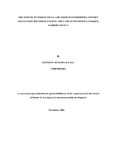| dc.description.abstract | Recognition of the economic significance of small businesses, and high-tech household businesses in particular grew during the last quarter of the 21st century is inevitable of global millennium development goals were to be met. This study aimed at determining the role of Risk taking, Innovations, Proactive, Social network and self-efficacy in SMEs’ role supporting and sustaining household needs focusing on Muthurwa market in Nairobi County. Sample of the study was 125 respondents. Data was collected using questionnaires and drop and pick technique was employed in the administration of the questionnaires. Simple random sampling was used to select the SMEs that participated in the study; Random sampling procedure ensured that all subjects have equal chances of being selected. SPSS was used in the coding and analysis of the data realized from the survey. The study found that the SMEs in Muthurwa mainly operated as sole traders. The SMEs had however outlived their initial stages of business establishment given that the enterprises had been in operation for a long time. The SME businesses remained small in size despite their many years of existence in business. The SME businesses were not diversified. A myriad of individual factors as well as environmental factors determined the success or failure of the SMEs in Muthurwa. The individual factors that determined business success were: gender, age, level of education, business training and entrepreneurial orientation. In terms of business challenges, the SMEs were affected by lack of credit, scanty market, technological handicap and unfavourable policy and regulatory environment. The entrepreneurs were also deficient of technical knowledge and business skills. The SMEs in Muthurwa were the sole source of support and sustenance of family needs. Income from the SME business were used to finance all the basic household needs. A significant share of income from the SMEs was spent on food, rent and school fees. Tailor-made business skills training programs should be developed in order to enhance the business acumen of the SME owners in Muthurwa. The right policies and regulatory environment should be created to encourage the entrepreneurs to engage in entrepreneurship. The SMEs themselves are encouraged to form marketing associations in order to address the problem of market scantiness. A similar study could be conducted in other locations to corroborate the findings of this study. | en_US |



